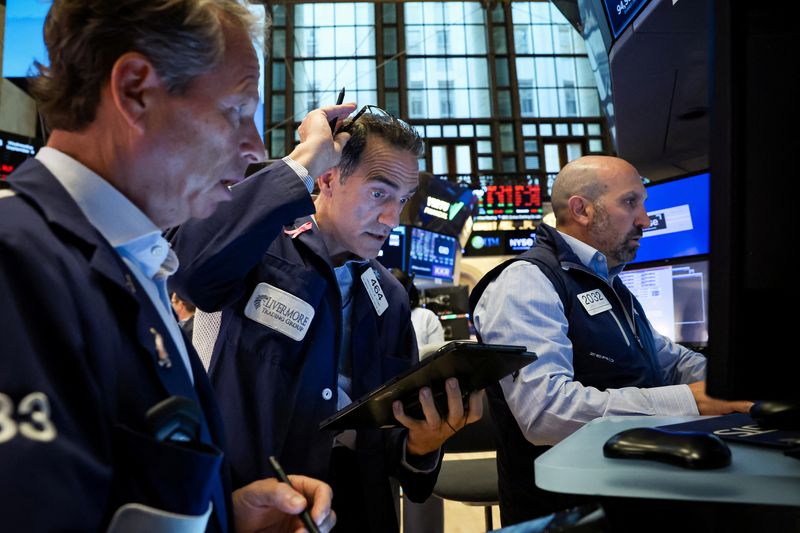A look at the day ahead in the US and global markets by Mike Dolan
Wall Street futures have rallied following Friday’s overblown market reaction to an otherwise mediocre employment report – with Apple’s (NASDAQ:) new iPhone and Tuesday’s presidential candidate debate next on the radar.
The August payrolls report was modestly weaker than expected, even though there was a significant improvement from July. Downward revisions from previous months softened the picture a little more.
But the report was not strong enough to completely allay fears of a slowdown and recession next year, nor weak enough to force the Federal Reserve to make a massive 50 basis point rate cut this month.
Key Fed policymakers Christopher Waller and John Williams underscored expectations that a cut is coming on September 18; the former even said the easing cycle should be “brought forward.” But neither seemed so panicked as to suggest that 50 bps was necessary yet.
By the end, the stock was down 1.7%, putting it down 4.5% for the week that is now the worst since March 2023 and once again underlines the seasonal decline that typically accompanies September.
In a more measured manner, Asian markets also followed a decline early on Monday.
And yet, even as markets have scaled back the expected size of this month’s Fed rate cut, there has been no change in the 112 basis points of Fed rate cuts priced in by year-end, nor in the 235 basis points in the next twelve months.
Ten-year Treasury yields hit their lowest level since June last year on Friday and two-year Treasury yields the lowest since March 2023. Both rose slightly on Monday, ahead of this week’s auctions of $119 billion in 3-year bonds. 10 and 30 years. Treasury Coupons.
US stock futures and European markets bounced back big today, ahead of another busy week – a likely second rate cut of the year by the European Central Bank on Thursday, Apple’s release of its new AI-infused iPhone on Monday and the televised showdown on Tuesday at the White House. House race.
The euro led the way ahead of the ECB’s decision, with likely GDP cuts and the central bank’s inflation forecasts on Thursday keeping alive hopes of a third rate cut as early as next month.
Even though the Fed appears to have clearly focused on the employment side of its dual mandate rather than the inflation side, Wednesday’s August CPI inflation report will be important to assess the extent of ongoing disinflation.
In that regard, deflationary pressure from abroad remains strong, with China last month once again recording deep annual producer price deflation of 1.8% and paltry consumer price inflation of just 0.6%, which also fell short of expectations.
Commodity markets are doubling down on this disinflation. While oil prices received support on Monday, they remain below $70 a barrel after hitting a 15-month low on Friday and are still showing year-over-year declines of more than 20%.
Inflation expectations for the US market are quickly evaporating.
The ten-year break-even inflation outlook, embedded in inflation-protected government bonds, is now just 2.04% – the lowest since January 2021. The two-year equivalent is just 1.87% – well below the 2% target of the Fed, which increases the risk that a significant undershoot of that target could be in the offing.
The New York Fed will release its August overview of household inflation expectations later on Monday.
Back in politics, the US election race heats up again this week with Tuesday’s first televised debate between US Democratic presidential candidate Kamala Harris and Republican challenger Donald Trump.
The stakes remain high as national polls show the two neck-and-neck battles returning, after a brief period in which Harris gained the upper hand after her appointment.
A poll from The New York Times and Siena College released Sunday found the two effectively on par, with Trump ahead of Harris by one percentage point — 48%-47%.
The gambling site PredictIt also has them in a dead heat again.
In Europe, former ECB chief and Italian Prime Minister Mario Draghi released his long-awaited report on reforming the European economy, urging the European Union to adopt a more coordinated industrial policy, faster decisions and massive investments if it wants to keep pace with the United States. and China.
In company news later on Monday, all eyes will be on Apple’s new iPhone series. The company’s stock rose 1.6% before the bell, along with most other Big Tech megacaps.
The Financial Times newspaper reported on Saturday that the latest iPhone A18 chip, which will be unveiled at the event on Monday, has been developed using Arm’s latest V9 chip design.
And shares of Boeing (NYSE:) rose 3% in US premarket trading after the planemaker reached a tentative deal with a labor union in the US Pacific Northwest that could avert a possible crippling strike later this week .
Key developments that should give more direction to US markets later on Monday:
* The New York Fed’s Inflation Expectations Survey, US Employment Trends in August, Consumer Credit in July; Inflation Mexico August
*Apple unveils new iPhone series
* US Corporate Earnings: Oracle (NYSE:)

* The US Treasury Department sells 3- and 6-month notes
(This story has been corrected to put the day in paragraph 26 as Monday, not Friday)
(By Mike Dolan, editing by Emelia Sithole-Matarise; mike.dolan@thomsonreuters.com)


